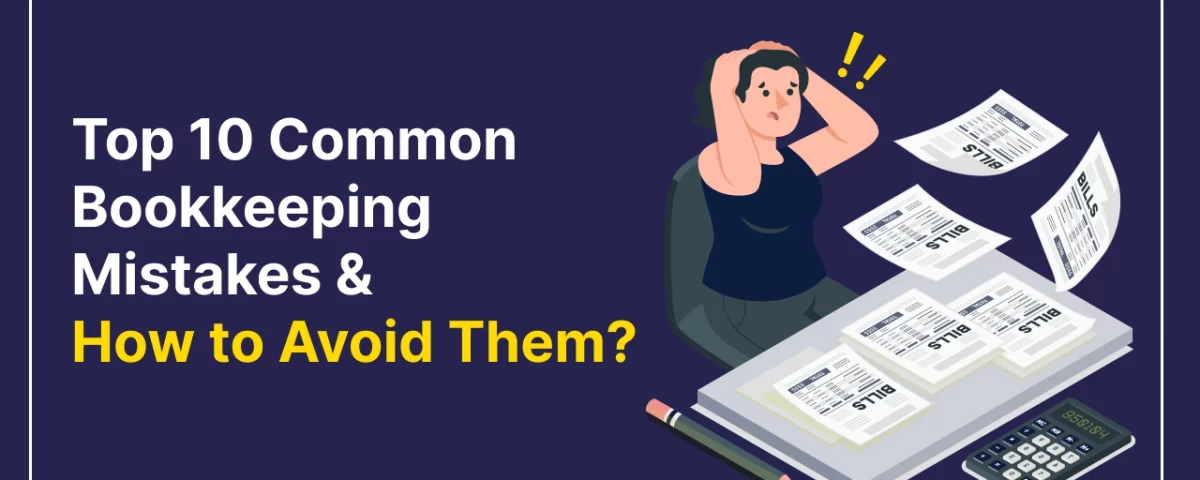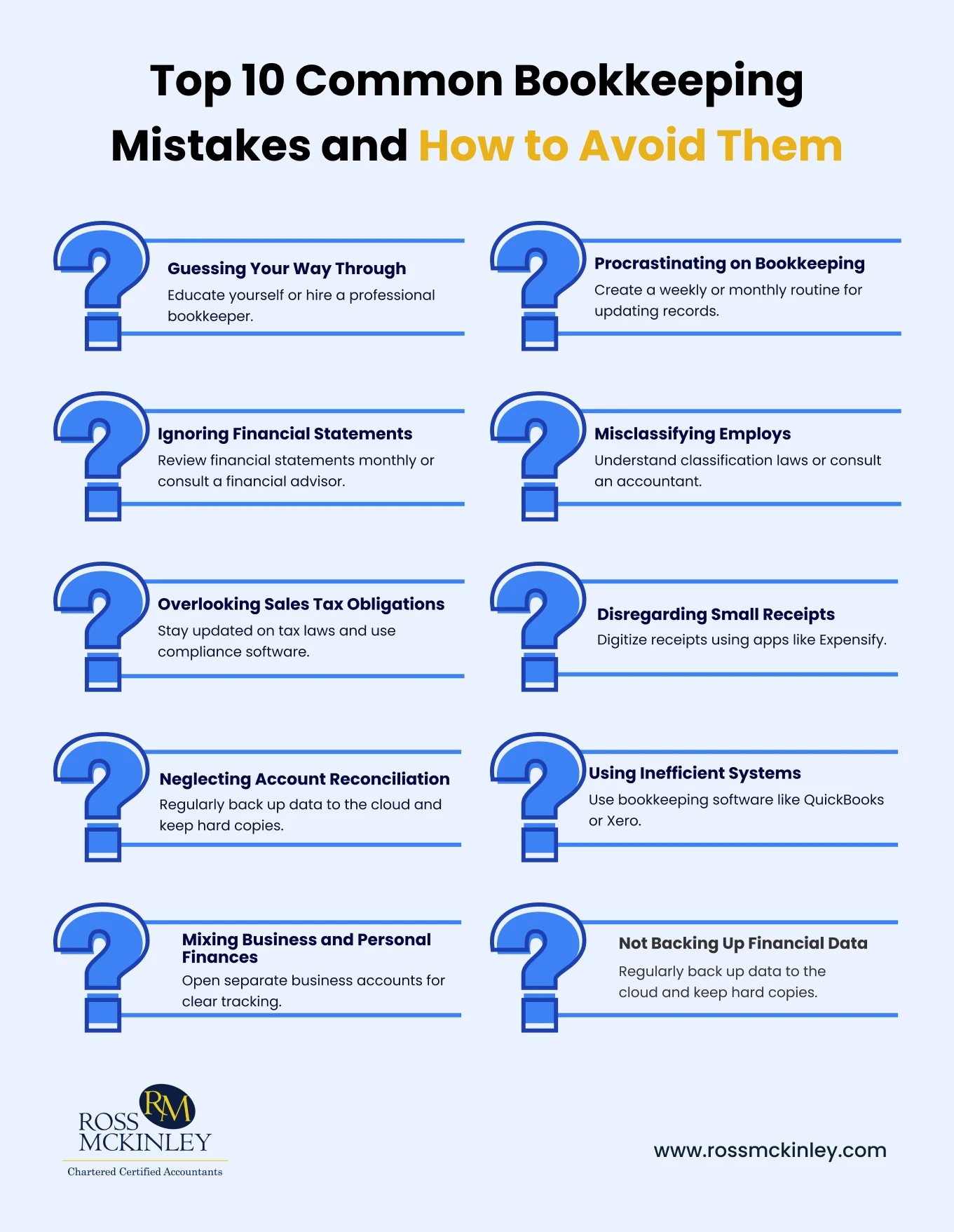
Step-by-Step Guide to Setting Up a Bookkeeping System
May 16, 2025
Bookkeeping Tips for Freelancers and Solopreneurs
May 18, 2025Top 10 Common Bookkeeping Mistakes and How to Avoid Them

Managing a business is like steering a ship. You need a strong, organised foundation to sail smoothly. Bookkeeping is that foundation. It might seem mundane compared to launching campaigns or closing deals, but you could be heading straight for an iceberg if your books are in disarray.
From missed tax deductions to compliance nightmares, bookkeeping mistakes can snowball into bigger issues, sinking your hard work and profits.
That’s a boomer, right? In this article, we’ll dive deep into the top 10 most common bookkeeping mistakes that entrepreneurs and business owners make. For each mistake, Ross McKinley gives you a practical solution so you can confidently navigate the choppy waters of financial management.
Whether you’re a small business owner or just starting your entrepreneurial journey, this guide will help you keep your financial records safe.

Table of Contents
What is Bookkeeping?
So, First things first. What is Bookkeeping? Bookkeeping is the systematic recording and organization of financial transactions within a business. Bookkeepers are responsible for maintaining accurate records of daily transactions, including sales, purchases, receipts, and payments.
Bookkeepers are responsible for various financial tasks, including recording transactions, reconciling bank statements, managing accounts payable and receivable, handling payroll, and preparing preliminary financial statements.
10 Common Mistakes and Their Ultimate Solution
Bookkeeping can lead to mistakes, but every mistake has a fix. Lets outline 10 common Mistakes business owners face and pair them with the ultimate solutions to keep your finances stress-free and organized.
1. Guessing Your Way Through Bookkeeping
When bookkeeping seems overwhelming, many business owners fall into the trap of guessing instead of learning. Misclassifying expenses or creating inconsistent records can cause errors that are difficult to untangle later.
The simple solution to avoid this is to Educate yourself on bookkeeping basics. Invest in workshops or online courses to understand how bookkeeping works. If time is a constraint, hiring a professional bookkeeper can ensure your records are accurate and reliable.
2. Using Inefficient Systems
Another common mistake businesses make is relying on outdated or inefficient book management systems, which can drain time and energy. Whether it’s manually entering data into spreadsheets or using software not suited for your business size, inefficiencies pile up.
To avoid this, Choose bookkeeping software tailored to your needs. Platforms like QuickBooks, Xero, or Wave can simplify the process, saving time and reducing errors. Customize your system to fit your business type for maximum efficiency.
3. Procrastinating on Bookkeeping
It’s tempting to delay bookkeeping when you’re juggling multiple responsibilities. However, letting things pile up leads to forgotten details, headaches, and tax surprises.
The solution to this is simple: Create a routine. Dedicate a specific time weekly or monthly to update your records. Consistency ensures accuracy and prevents the panic of last-minute catch-ups.
4. Mixing Business and Personal Finances
Using personal accounts for business transactions or vice versa is a recipe for chaos. It complicates tax preparation and makes tracking your business’s financial health harder.
Opening separate business accounts and using them exclusively can maintain clear and professional records. Another problem fixed right away!
5. Ignoring Financial Statements
Financial statements are the map that shows you where your business stands and where it’s heading. Failing to review them regularly can result in missed opportunities or undetected issues.
Businesses can avoid this by Scheduling monthly reviews of their income statement, balance sheet, and cash flow statement. If they’re not confident interpreting these, a financial advisor can provide valuable insights.
6. Disregarding Small Receipts
Small receipts might seem unimportant, but collectively, they could represent significant deductions. Tossing them aside risks losing potential savings and documentation for audits.
Here’s where the 21st century comes into play: You can digitize your receipts. There are dozens of Apps that let you capture and organize receipts on the go, ensuring no expense is left undocumented.
7. Misclassifying Employees
Incorrectly categorizing workers as employees or contractors is a common error with potentially severe tax penalties and compliance issues.
Businesses can avoid this by understanding the criteria for classifying employees versus contractors. Consult labor laws or an accountant to ensure compliance with tax regulations.
8. Neglecting Account Reconciliation
Failing to reconcile your accounts means your books might not match your bank statements, which can lead to unnoticed errors or fraudulent transactions.
Well, we all hope this never happens, as you can fix this by Reconciling your accounts monthly. Use software features that automate this process, which makes it easier to catch discrepancies early.
9. Not Backing Up Financial Data
A system failure or accidental deletion could wipe out critical financial information, leaving you vulnerable to audits or tax problems.
Get some hard drives to back up your data regularly, and you’re good to go. Another efficient way is to use cloud storage services and keep a hard copy of essential documents for added security.
10. Overlooking Sales Tax Obligations
With changing tax regulations, especially for online businesses, not collecting or remitting sales tax correctly can lead to hefty fines.
Businesses can avoid this by staying informed about sales tax laws in their operating regions. A pro tip is to use tax compliance software to automate calculations and filings.
We’re Here To Help
Ross McKinley offers accurate accounting solutions for financial clarity and peace of mind. From meticulous record-keeping to expert financial insights, we’ve got you covered. And honestly, let’s not sugarcoat it—not hiring Ross McKinley is probably the 11th mistake on this list. So, Why learn the hard way when we’re here to make things simple?
Conclusion
Bookkeeping doesn’t have to be a headache if you approach it proactively. By understanding and avoiding these common mistakes, you can ensure your records remain accurate, your business stays compliant, and your growth trajectory stays on course.
It’s time to ditch the stress and embrace clean, organized books!
